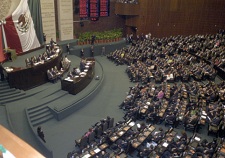 The Latin word scamnum came to Spanish as a seat . The first meaning of the term mentioned by the Royal Spanish Academy ( RAE ) in its dictionary refers to a bench that has a backrest and on which at least three individuals can sit.
The Latin word scamnum came to Spanish as a seat . The first meaning of the term mentioned by the Royal Spanish Academy ( RAE ) in its dictionary refers to a bench that has a backrest and on which at least three individuals can sit.
The seat is a type of furniture that resembles an elongated chair. The notion is also used to name the seat intended for parliamentarians in the different legislative chambers.
By extension to this last meaning, the most common use of the concept today emerged: the position that, upon being elected, a legislator occupies in a representative chamber is called a seat. For example: “The deputy from Córdoba resigned due to health problems and his seat will be occupied by a young man from Santa Fe” , “I was offered to fight for a seat in the Senate, but I prefer to continue working in the Ministry of Tourism” , “The National Constitution prevents the leader of the Conservative Party to appear in the next elections to renew his seat.”
The number of seats in a chamber depends on the country and the body. In the United States House of Representatives (the lower house of Congress ), to cite one case, there are 435 seats . The representation of each state in this chamber is proportional to its number of inhabitants, with all states having a minimum of one representative.
The United States Senate (the upper house), meanwhile, has 100 seats . In this case, all states have two representatives. Senators remain in office for six years and have the possibility of being re-elected.
On July 21, 2010, a political party called Escaños en Blanco was founded in Badalona, Barcelona, whose objective is to fight so that blank votes are recognized and become empty seats. For those citizens who are not satisfied with the government proposals of the different parties, Blank Seats provides them with representation .
In its program, this party promises those who give it their vote not to take office or occupy any seat that corresponds to them. Likewise, they reject the money as remuneration, both for the party and for each member, that they should receive as a result of the votes.
 In its manifesto, which can be consulted on its website, Escaños en Blanco expresses its three main objectives:
In its manifesto, which can be consulted on its website, Escaños en Blanco expresses its three main objectives:
* make visible without margin of error the discontent that a large portion of the people feel with respect to the political class that governs them, through which they do not feel represented;
* make society in general and the media aware of this dissatisfaction, through an innovative, original and, most importantly, democratic plan, to contribute to a public debate that focuses on the decline of the representation system of the Spanish people;
* exert a greater degree of pressure on other political parties to work diligently in the development of their activity based on respect and ethics, through legislative and government initiatives that encourage the free participation of people, regardless of the elections that take place every four years.
The Blank Seats party has declared that it will be dissolved when a reform of the electoral law arises that takes into account a new type of vote that allows not to opt for any of the available parties and that gives rise to empty seats. So far, a blank vote has no practical use for the citizen once the recount has been carried out: there will always be others who choose one of the alternatives, and therefore discontent will continue once the new party is chosen.
